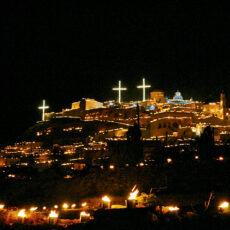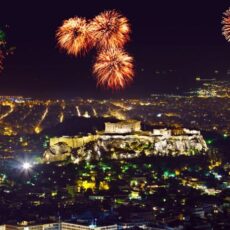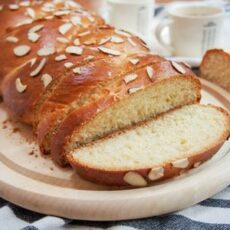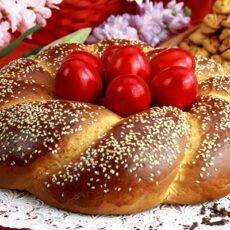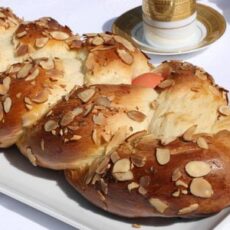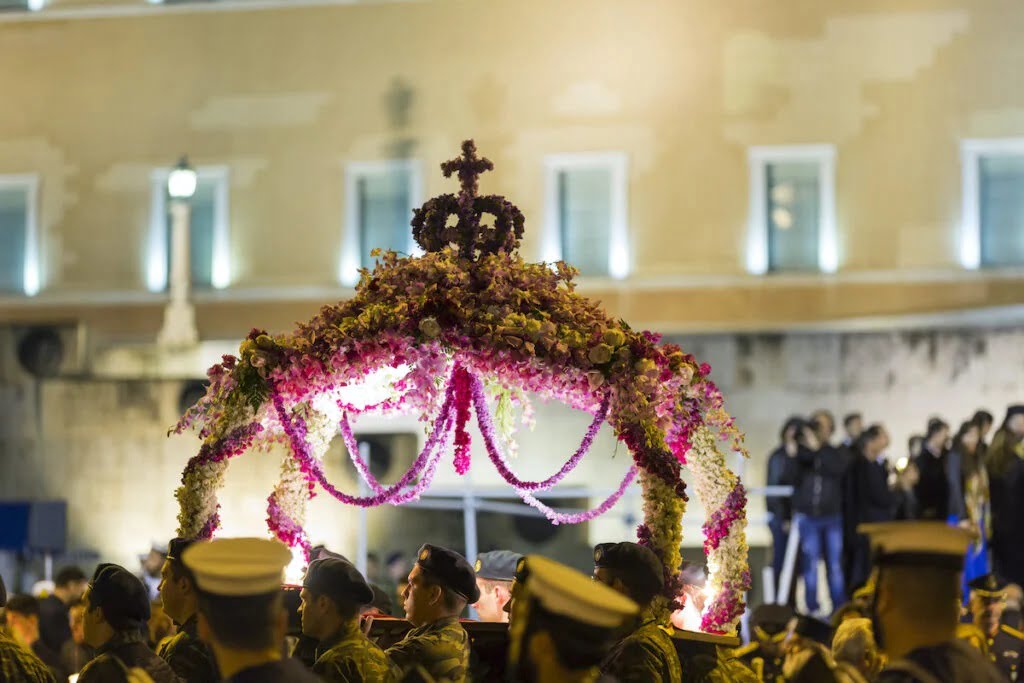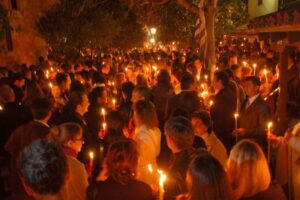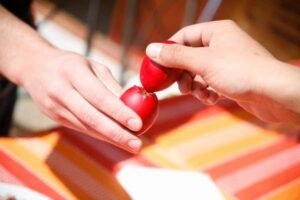Easter in Greece: a colourful experience
Easter in Greece: the biggest and most adored celebration on the Greek Orthodox calendar, even bigger than Christmas.
For Greeks, it is considered an honor to commemorate the fact Jesus was crucified for their sins. Hence many undergo several weeks of fasting leading up to Easter week and the Easter weekend, when this process reaches its peak. During the period of Lent, there is also a timeframe when Carnival celebrations take place across Greece, in some ways like Halloween is celebrated in other countries. Mostly a remnant of older, pagan celebrations from different eras. However, the focus is more on the costumes and the jolly-ness and folly-ness rather than scary and darker apects that are often more central to the Halloween theme. It is a much celebrated and joyful period in its own right.
As Easter week approaches and during its course, there are several religious or cultural events, including specific church services, processions and colourfully interesting customs. Following the peak event taking place exactly at midnight of the Great Saturday as it is referred to locally, the celebrations of the Resurrection of Christ begin. They include a whole range of family, social, religious and cultural celebrations, usually accompanied by the appropriate range of gastronomical delights. Paying a visit to Greece during this special time, is certainly among our top suggestions if you are intrigued by any of the above.
Greek Orthodox Easter Pleasant Peculiarities
Lent starts exactly 40 days before Greek Orthodox Easter. It is a period of fasting for some, though certainly not all Greeks. No meat products are eaten by the people who follow this practice, and as Easter Saturday approaches, several more gastronomical choices are excluded like cheese, milk and eggs. Lent actually starts on a specific Thursday of the year called ‘Tsiknopempti’, meaning ‘smokey Thursday’.
That is when all meat products in the house are cooked into a delicious meal for one final round of absolute meat-packed joy before meat is not to be consumed again for 40 days leading up to midnight on Easter Saturday. Most people will arrange a meat-celebrating feast either at home or outside with friends and family to enjoy this special joyful day. Many will take the opportunity celebrate the day, and will continue to consume meat thereafter!
During Lent, bloodless fish is still ‘permitted’, so tavernas tend to enrich and boost up their range, quality and availability of several sea delicacies during this time. Taramasalata is just one among the top performers of this period. A visit to a good taverna tasting delicious calamari and other sea-sourced delights accompanied by a proper Greek salad is an experience that many expect all year, relish in and cherish. Note that all foods are available during this period, as not everyone follows this practice, so you need not worry about not enjoying all your other favourite Greek delicacies if you are visiting!
The 'Great Week', aka 'Megali Evdomada'
Easter in Greece climaxes during the ‘Megali Evdomada’ which translates to ‘The Great Week’. Definitely the most important religious holiday of the Greek Orthodox Church and a wider social and cultural event, it is widely celebrated across the country and the whole globe. It is accompanied and characterised by cultural traditions and customs that date back many centuries. Various local customs, often unique in their own way exist throughout the Greek mainland, each colourfully characterised by local traditions, tales and events. Some however are celebrated throughout Greece, and attended by almost everyone.
Great Thursday
Various preparations start taking place, such as the making and baking of “tsoureki” (traditional sweet bread), and the dyeing of eggs in red colour which symbolises Christ’s blood and the rebirth of life. In the evening, all churches include a symbolic representation of the crucifixion and the reading of the twelve gospels. After the service women gather to decorate the Epitaph with fresh spring flowers, while the heavy mourning period actually begins.
Great Friday aka Good Friday
On the Great Friday, church bells ring mournfully all day. Food consumed is often very ‘simple’ and bare of the basics, even olive oil, as the day is considered the most important fasting day of the Holy/Great Week. Just to reassure you, life and food options will continue as normal for those not fasting, so you will not need to restrict yourself in any way now either! Perhaps finding a grillhouse open may be a slight challenge just on this day, but that’s all the difference you may notice.
During the day, people can visit their local church and pay tribute to the Epitaph which stands there decorated in flowers. It was often customary for younger children to pass underneath, though this is a custom you will now sometimes only find in more rural areas. In the evening, a funeral service is held at each church, and the Epitaph is carried on the shoulders of the faithful in a procession through the community, followed by everyone holding their lit candles.
Great Saturday
The Eternal Flame arrives in Greece by airplane from Jerusalem, and is distributed to local priesthoods who then carry it back to their churches. The service usually starts at 23:00 and people start to gather at their local churches holding the ‘labatha’, essentially a specific large candle, only to be used on that special Easter midnight service. Traditionally, it is one’s Godfather and/or Godmother that gifts the ‘labatha’ to their Godchildren.
A few minutes before midnight many people gather outside the church and exactly at midnight priests call out ‘Christos Anesti’, meaning ‘Christ has risen’, and pass the ‘Holy Flame’, or ‘Holy Light’ to those nearest to them in the service. Then each person lights the next person’s lambatha in a very scenic-looking process that is a delight in its own right. The ‘light’ travels to each person, each household, business and place.
Fireworks usually light up the sky and people exchange the traditional Easter wishes saying ‘Christos Anesti’ or ‘Christ has risen’, while the other person replies ‘Alithos o Kirios’ or ‘Alithos Anesti’ meaning ‘He, the Lord, has truly risen’. It is customary to carry the ‘Holy Light’ back home and ‘smoke’ the doorframe in order to bless the house for the coming year. Once home, family and friends gather to eat the traditional soup “maghiritsa” and ‘battle’ each other by hitting one red egg (symbolizing the opening of Christ’s tomb) against another held by the other person. The one who cracks both sides first is the winner!
Easter Sunday
Early in the morning on Easter Sunday the spits are set to work, and grills are fired up. Easter tables are prepared and family and friends celebrate with a meal that includes a whole roasted lamb or goat prepared on the spit, or baked in the oven. Great Greek wines, tsipouro, and other drinks flow freely, and preparations for the meal turn into festive celebrations even before eating begins.
Spending your Easter in Greece can be a uniquely fantastic experience, filled with cultural and social events, plenty of delicious food and festivities, and a very colourful and vibrant vibe in the air. If you would like to know more, arrange a trip during the next Easter season or find out how you can customise your trip to fit your own needs, interests and likes, just let us know.
We will work together to create the most unforgettable travel experience for you!


